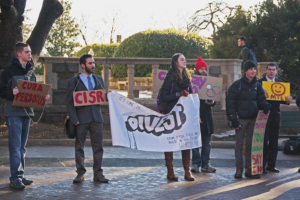Student group GU Fossil Free delivered a letter to University President John J. DeGioia on Friday outlining its request for Georgetown to divest from tar sand oil companies.
“By investing in tar sand oil companies, Georgetown tacitly endorses and profits from a destructive, unjust industry,” the letter to DeGioia reads. “We call on you to join [the signatories], in favor of the proposal and assist in its passage by the Board of Directors so as to further align the Endowment Fund with our Jesuit values.”

The letter was delivered in advance of the spring reconvening of the Committee Investment and Social Responsibility, which advises the university on socially responsible investment policies. GUFF’s initial proposal was submitted to the committee in November 2017, at which time the proposal had garnered 200 signatures from members of the Georgetown community.
CISR committed in November to reviewing the proposal at its next meeting, which is expected to occur in March.
Celia Buckman (SFS ’21), a member of GUFF, said now is an important time for DeGioia to hear GUFF’s message.
“We think that it’s important for President DeGioia to get our message now because we’re expecting CISR, the committee that reviews the proposal, to have a vote around March, so getting that kind of institutional pressure on CISR to support and represent the interests of the majority of students of at Georgetown as well as coming from the top of the administration,” Buckman said.
GUFF also wanted to highlight the diversity of student support it has received since the proposal was submitted in November, according to Buckman.
The petition now has 326 signatories — including Georgetown students, alumni, faculty and staff — as well as 13 student organizations, including Georgetown Renewable Energy and Environmental Network and the Georgetown Solidarity Committee.
The letter reiterates the main points of GUFF’s November proposal. In particular, it highlights the environmental harm presented by tar sand oil extraction, which is significantly more severe than other types of oil extraction. GUFF argues that refusing to divest from tar sands oil extraction would violate the Socially Responsible Investment Policy approved by the board of directors last June.
“The University shall use reasonable efforts to avoid investments in companies that have demonstrated records of widespread violations of human dignity. As examples, this includes companies that are directly and significantly involved in the production of weapons that are intended to be used for indiscriminate destruction and companies that are engaged in activities having an extremely deleterious effect on the environment,” the policy states.
Georgetown’s continued investment in fossil fuels is counter to its identity as a conscientious and progressive institution, Samantha Panchèvre (SFS ’19), a GUFF member, told The Hoya in a November interview.
“Georgetown is educating its students to be leaders in the world, to fight for a better political and social environment and climate change is throwing all of that into disarray. So, by funding climate change, it’s very counterintuitive for an institution like Georgetown to fund climate change and also tell its students to go out and fight climate change,” Panchèvre said.
Rachel Pugh, the university’s senior director for strategic communications, said the proposal has remained at the initial stages of the approval process since November.
“Georgetown’s Committee on Investments and Social Responsibility (CISR) received GU Fossil Free’s proposal last November. CISR had a preliminary discussion about this proposal at its November meeting. CISR will meet again in the next few weeks to continue its review of this proposal,” Pugh wrote in an email to The Hoya.
If it receives approval from the CISR, GUFF’s proposal will move to the Committee on Finance and Administration within the board of directors for further consideration.
Although GUFF members acknowledge the process is going slowly, they have not expressed concern about its current pace.
“It’s following a timeline we kind of expected,” Buckman said.



















